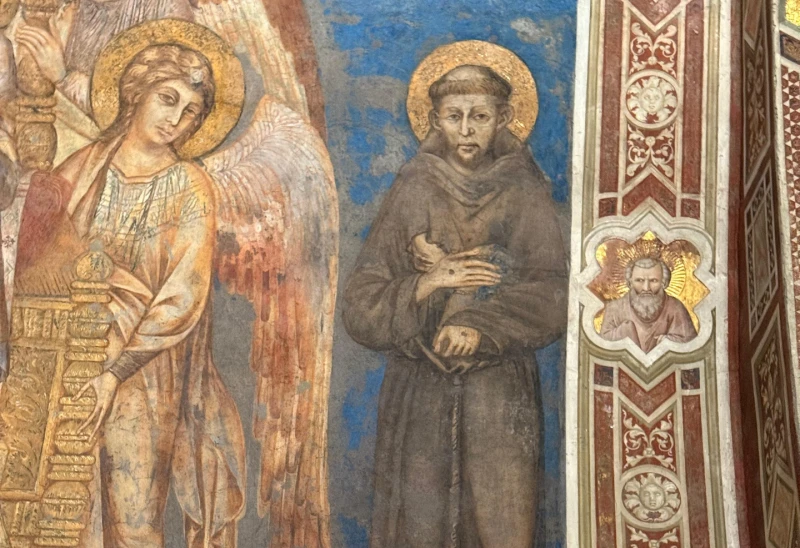
A 13th-century fresco of St. Francis of Assisi by the Florentine painter Cimabue, one of the earliest depictions of the saint, is located in the lower church of the Basilica of St. Francis of Assisi in Assisi, Italy. / Credit: Jacob Stein/Crux Stationalis
Rome Newsroom, Oct 2, 2025 / 08:00 am (CNA).
Italy’s Senate Constitutional Affairs Committee, deliberating in session Wednesday, Oct. 1, approved a bill reinstating Oct. 4, the feast of St. Francis of Assisi, the patron saint of Italy, as a national holiday. The measure had been approved in first reading by the Chamber of Deputies last month, with only two votes against.
Oct. 4 will therefore be a public holiday starting in 2026, after having been a public holiday until 1977.
“I welcome with joy and satisfaction,” Prime Minister Giorgia Meloni commented, “the news of the Senate’s final approval of the parliamentary bill reintroducing, after 50 years, Oct. 4, the day on which we celebrate St. Francis, the patron saint of Italy, as a national holiday. The government has wholeheartedly supported the [legislative] process of the bill, which has taken up and made its own the appeal launched a year ago by Davide Rondoni, poet and president of the National Committee for the Celebrations of the Eighth Centenary of the Death of the Poverello [Poor Man] of Assisi.”
“The bipartisan and virtually unanimous support for the bill is an important sign of the unity found in politics around one of the most representative and distinctive figures of [our] national identity. A saint beloved by the entire Italian people and in whom all Italians identify. The national holiday will be an opportunity to celebrate an extraordinary man and remind us, every year, who we are and what unites us profoundly,” Meloni said.
The president of the Italian Bishops’ Conference, Cardinal Matteo Maria Zuppi, also released a comment following the Senate’s approval:
“We welcome with joy the news of the passage of the law restoring the national holiday of St. Francis of Assisi to Oct. 4. This decision offers an opportunity to rediscover the figure of the patron saint of Italy, who has profoundly shaped the character of our country. This is even more so in this time, torn by divisions, growing international tensions, and a dramatic escalation of global violence. St. Francis, whose primary goal was to proclaim peace, reminds us that a fraternal, unarmed world is possible, where everyone has their own space, starting with the poorest and most vulnerable.”
“His life and work,” the archbishop of Bologna continued, “can inspire political love and love for creation, so that the common good prevails over speculative logic and the logic of the strongest, over partisan interests and polarization.”
“By virtue of his faith,” the cardinal said, “he initiated a religious experience that, through his descendants, now eight centuries old, has contributed greatly to improving the history of humanity in our Italy and throughout the world. Celebrating the saint of Assisi, therefore, means believing that we can dialogue with everyone and that peace begins when we consider others as brothers and sisters. Francis of Assisi still encourages us today to be authentic Christians [wherever we may be in] the world.”
This story was first published by ACI Stampa, CNA’s Italian-language news partner. It has been translated and adapted by CNA.















